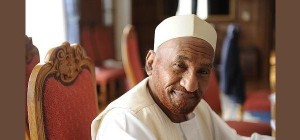Sudan: Arrest of former prime minister jeopardizes national dialogue
 The incarceration of the leader of the opposition National Umma Party (NUP) and former Prime Minister of Sudan, Sadiq al-Mahdi, this weekend, has attracted widespread criticisms and is threatening to derail the much applauded efforts to bridge the divide between the country’s key political factions.
The incarceration of the leader of the opposition National Umma Party (NUP) and former Prime Minister of Sudan, Sadiq al-Mahdi, this weekend, has attracted widespread criticisms and is threatening to derail the much applauded efforts to bridge the divide between the country’s key political factions.
al-Mahdi has been critical of the country’s counter insurgency forces; accusing them of raping civilians, looting their properties and committing other war crimes in Darfur. However, the Rapid Support Forces have officially denied these allegations.
Reports indicate al-Mahdi has been charged with treason. His grand-daughter, Mariam, told Reuters that he has also been accused of “halting the constitutional system and inciting hatred against the state.”
She further disclosed that the veteran politician faces life imprisonment or a death sentence if he is found guilty.
Meanwhile, the Secretary of the Umma Party, Sara Najdallah, has told the press that the arrest of al-Mahdi reveals the lack of commitment of the ruling National Congress Party (NCP) to the national dialogue process.
She went on to note that it marks the end of the talks with the government and has called on the party’s supporters “to express rejection of this step in the capital and the provinces in a peaceful fashion.”
al-Mahdi’s Umma Party and the Popular Congress Party (PCP) are the only major opposition groups that have responded favourably to President Omar al Bashir’s call for national dialogue.
A coalition of about 17 opposition parties had demanded that the government eliminates its barriers to individual and political freedom and release all political detainees before they would join the talks.
At the initial meeting last month – attended by about 83 Sudanese political groups – reports indicate that President Bashir acquiesced to some of these demands as he guaranteed freedom of political association and vowed to released all persons who have been wrongfully incarcerated. He also expressed his willingness to allow rebels partake in the discussions.
In light of this conciliatory move, two major opposition coalitions, Sudan Revolutionary Front (SRF) and the National Consensus Forces (NCF) disclosed that they have decided to participate in the talks. They, however, have demanded that it is overseen by an independent third-party.
Earlier last week, the government had announced that the highly anticipated meeting was set to be convened sometime this month.
The Secretary of the ruling NCP, Mustafa Osman Islmail, told the press that the government would not continue to wait on other political parties to come aboard. He further instructed all parties who had agreed to attend the gathering to nominate their representatives.
Following this development, ex-South African leader, Thabo Mbeki, who is currently the head of the African Union High Level Implementation Panel, visited Khartoum to meet with representatives of the country’s different political factions. He stressed the need for reconciliation to ensure next year’s polls reflects the democratic will of the Sudanese people.
It is unclear how much the recent development would affect the national dialogue process. However, pundits say it is likely to precipitate the end of the latest attempt at national reconciliation.
Since Sudan’s independence from British and Egyptian colonial rule in the 1950s, the country has been plagued by internal strife.
At the beginning of this millennium, local tribal groups went to war with the government for allegedly ignoring and oppressing the non-Arab sections of the population. Although several cease-fire agreements have been signed, isolated confrontations continues to be reported in several parts of the war-torn nation.
Meanwhile, the country’s economy is struggling since the splitting of South Sudan a few years ago.
Reports indicate that inflation has increased sharply and the value of the Sudanese pound has fallen to record levels against other currencies. Despite the government’s unpopular austerity measures, the economy has failed to show any signs of improvement.
Photo/Sudan Views.